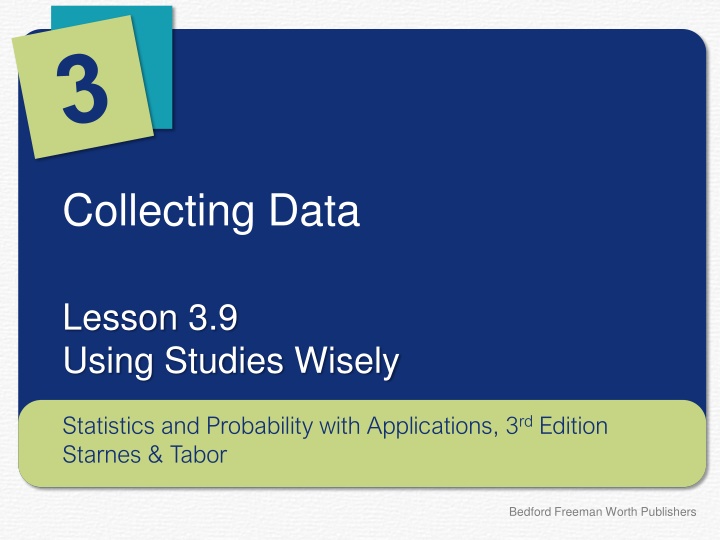
Using Studies Wisely in Statistical Inferences
Learn about the importance of using statistical studies wisely, including making inferences about populations, cause and effect, and ethical considerations when conducting studies. Explore a case study on foster care versus orphanages and the ethical implications of involving young children in research.
Download Presentation

Please find below an Image/Link to download the presentation.
The content on the website is provided AS IS for your information and personal use only. It may not be sold, licensed, or shared on other websites without obtaining consent from the author. If you encounter any issues during the download, it is possible that the publisher has removed the file from their server.
You are allowed to download the files provided on this website for personal or commercial use, subject to the condition that they are used lawfully. All files are the property of their respective owners.
The content on the website is provided AS IS for your information and personal use only. It may not be sold, licensed, or shared on other websites without obtaining consent from the author.
E N D
Presentation Transcript
Collecting Data Lesson 3.9 Using Studies Wisely Statistics and Probability with Applications, 3rdEdition Starnes & Tabor Bedford Freeman Worth Publishers
Using Studies Wisely Learning Targets After this lesson, you should be able to: Identify when it is appropriate to use information from a sample to make an inference about a population and when it is appropriate to make an inference about cause and effect. Evaluate if a statistical study has been carried out in an ethical manner. Statistics and Probability with Applications, 3rdEdition 2 2
Using Studies Wisely Researchers who conduct statistical studies often want to draw conclusions (make inferences) from the data they produce. The type of inference that can be made from a study depends on how the study was designed. The Scope of Inference Random selection of individuals allows inference about the population. Random assignment of individuals to groups permits inference about cause and effect. Statistics and Probability with Applications, 3rdEdition 3 3
Using Studies Wisely This chart summarizes the appropriate scope of inference based on the design of a study. Statistics and Probability with Applications, 3rd Edition 4 4
Using Studies Wisely Although randomized experiments are the best way to make an inference about cause and effect, in some cases it isn t ethical to do an experiment. Basic standards of data ethics must be obeyed by all studies that gather data from human subjects, both observational studies and experiments. Basic Principles of Data Ethics All planned studies must be reviewed in advance by an institutional review board charged with protecting the safety and well-being of the subjects. All individuals who are subjects in a study must give their informed consent before data are collected. All individual data must be kept confidential. Only statistical summaries for groups of subjects may be made public. Statistics and Probability with Applications, 3rd Edition 5 5
LESSON APP 3.9 Is foster care better for children than an orphanage? Do abandoned children placed in foster homes do better than similar children placed in an institution? The Bucharest Early Intervention Project found that the answer is a clear Yes. The subjects were 136 young children abandoned at birth and living in orphanages in Bucharest, Romania. Half of the children, chosen at random, were placed in foster homes. The other half remained in the orphanages. (Foster care was not easily available in Romania at the time and so was paid for by the study.) 1. What conclusion can we draw from this study? Explain. 2. The children in this study were too young to pro- vide informed consent. Does this make this study unethical? Explain. Statistics and Probability with Applications, 3rd Edition 6 6
Using Studies Wisely Learning Targets After this lesson, you should be able to: Identify when it is appropriate to use information from a sample to make an inference about a population and when it is appropriate to make an inference about cause and effect. Evaluate if a statistical study has been carried out in an ethical manner. Statistics and Probability with Applications, 3rd Edition 7 7
